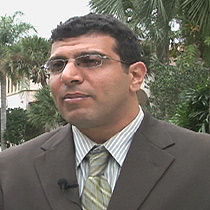-
(单词翻译:双击或拖选)
Orlando, Florida
07 June 2007
A little more than a decade ago, the number of people studying foreign languages in the U.S. colleges was on the decline. Now, the Modern Language Association of America reports enrollment1 is rising rapidly--in both overall numbers and the percentage of students taking foreign language. Other studies indicate many of those in language classes are known as "heritage speakers." That would include immigrants taking refresher courses in their native tongues or descendants of migrants who are now studying the language of their parents or grandparents.
In a Florida classroom, Barbara Leach2 and Marcella Bush practice Polish with their teacher. They are what experts call 'heritage speakers.' Leach grew up in the United States but her Polish parents did not speak English at home. Now, decades after speaking Polish as a child, Leach has decided3 to take up the language again.
"After my mother passed away 15 years ago I did not have anyone to speak Polish to and you end up, if you do not use it, you forget it,” Leach explains. “So I have decided to take the Polish classes and it has really helped a lot because once I started taking those I started thinking back in Polish -- when I would see a chair, instead of thinking it is a 'chair,' I am thinking of it in Polish."
The U.S. Census4 Bureau estimates about two thirds of a million Americans speak Polish at home.
Here in Florida where the two women are studying their traditional language, Bush says interest is booming. "We usually have about 20 people in the Polish classes so that is kind of amazing to have 20 people interested in learning a very difficult language."
China is another country whose language is gaining in popularity in the U.S. At last count, the language association found a record 34,000 college students were studying Chinese. And a linguistics5 group stated an increasing number of those students are of Chinese descent.
 |
| Dr. Ilon Alon |
The U.S. government funds work promoting heritage language skills. For example, the U.S. gave more than $300,000 dollars to the University of California to track minority language use each year in immigrant communities.
But Sophia Wu from Orlando's Chinese School of Tomorrow says training programs for heritage instructors7 are lacking, especially for those teaching younger students. "The kids, it depends on their level at home -- they have different levels of mastering the language. The teacher and the material, the text book, is not really now suited for this group so there is a lot of things needed to be done."
Across the U.S., in states like Florida, demand for heritage language courses continues to grow. Arabic, Korean, Vietnamese and Russian have all seen a surge in popularity. And one study estimated that around half of those enrolling8 in such language courses are heritage speakers.
 收听单词发音
收听单词发音
1
enrollment

|
|
| n.注册或登记的人数;登记 | |
参考例句: |
|
|
|
2
leach

|
|
| v.分离,过滤掉;n.过滤;过滤器 | |
参考例句: |
|
|
|
3
decided

|
|
| adj.决定了的,坚决的;明显的,明确的 | |
参考例句: |
|
|
|
4
census

|
|
| n.(官方的)人口调查,人口普查 | |
参考例句: |
|
|
|
5
linguistics

|
|
| n.语言学 | |
参考例句: |
|
|
|
6
full-time

|
|
| adj.满工作日的或工作周的,全时间的 | |
参考例句: |
|
|
|
7
instructors

|
|
| 指导者,教师( instructor的名词复数 ) | |
参考例句: |
|
|
|
8
enrolling

|
|
| v.招收( enrol的现在分词 );吸收;入学;加入;[亦作enrol]( enroll的现在分词 );登记,招收,使入伍(或入会、入学等),参加,成为成员;记入名册;卷起,包起 | |
参考例句: |
|
|
|















